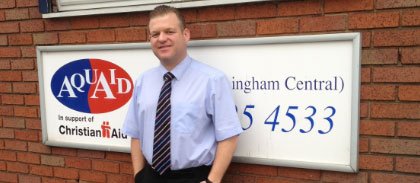
by Fern Shaw | Feb 22, 2013 | Charity, Water Coolers
As was mentioned in our previous blog, we at AquAid Birmingham maintain great staff retention partly due to our work ethic and partly due to our organisation being staffed by a team of professionals who also care about those other than themselves.
This attitude is spearheaded by Scott Barnbrook, who is the Regional Manager here at AquAid Birmingham.
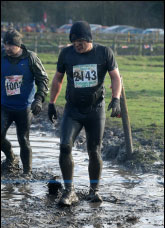 Scott has just competed in the www.toughguy.co.uk competition and in doing so, raised in excess of £500 for Birmingham Dog’s Home www.birminghamdogshome.org.uk , further illustrating that it’s not just about a fellow man, but man’s best friend too.
Scott has just competed in the www.toughguy.co.uk competition and in doing so, raised in excess of £500 for Birmingham Dog’s Home www.birminghamdogshome.org.uk , further illustrating that it’s not just about a fellow man, but man’s best friend too.
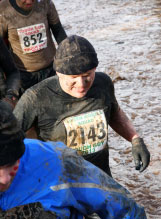 AquAid Birmingham believes strongly in optimum service, by ensuring that we effect prompt deliveries. This allows us to maintain multiple key accounts, a few examples being large contracts with many large building sites where they are on lengthy projects building new hospitals and large Tesco’s stores.
AquAid Birmingham believes strongly in optimum service, by ensuring that we effect prompt deliveries. This allows us to maintain multiple key accounts, a few examples being large contracts with many large building sites where they are on lengthy projects building new hospitals and large Tesco’s stores.
AquAid Birmingham’s efficient and knowledgeable account managers and sales team are available for anyone requiring water cooler; water boiler or drinks solutions for their school, organisation or company.
Please feel free to fill out the form below to have one of the team contact you. We’ll be delighted to assist you
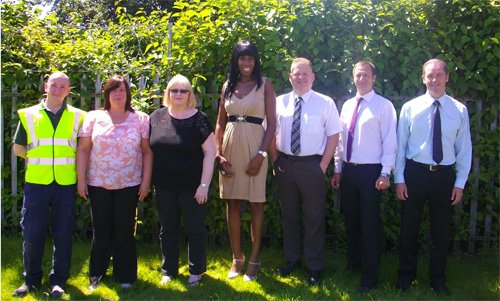
by Fern Shaw | Feb 8, 2013 | Water Coolers
Inception and operations
We’ve been in operation for 13 years. An indication of our commitment to what we do shows in our great staff retention:
- Lindsey Page, our dynamic Office Manager, has been with AquAid for 10 years
- Joe Farnell, Account Manager extraordinaire, with AquAid for 7 years
- Pete Dinger, Clive Homer and Paul Unitt have been with us for 5 years
We have a total staff contingent of 13 people who are dedicated to offering our very extensive customer base, 780 Bottle fed water coolers and 1538 Mains fed water coolers, with unrivaled service and attention.
Monies raised
In 2012 AquAid Birmingham raised £43 000 for our hand-picked charities that provide, amongst other sustainable projects, clean drinking water to communities in Third World countries. That translates to enough funds for 4 300 children to have drinking water for life.
EDWCA Audit
The EDWCA, European Drinking Water Cooler Association (previously known as the European Point-Of Use Drinking Water Association EPDWA), is an association that was formed to “promote, develop and maintain the highest standards of hygiene, safety and ethics within the European Point-Of-Use Drinking Water industry to the benefit of customers.”
We are delighted to announce that last year we scored 100% in our EDWCA audits. This means that not only do we adhere to the stringent EDWCA requirements and take pride in our work, but that our valued customers benefit from us meeting and surpassing these standards too.
by Fern Shaw | Jan 30, 2013 | Water Coolers
Drinking sufficient water increases employee productivity and employee wellness is an important issue for companies both big and small.
Did you know that employees not performing at their best may be dehydrated? According to health news, scientific evidence between cognitive performance and dehydration is strong and continues to grow. It’s believed that the more hydrated you stay throughout the day the more constructive you are.
There are other benefits to the company and employees alike:
- Improved productivity – A water cooler will constantly supply cooled fresh water – a jug in the fridge has to be constantly refilled from a tap. People have to wait for the kettle to boil.
- Reduced electricity consumption – A water cooler or water boiler means water-on-tap from a central point as opposed to constantly opening and closing the fridge door or repeatedly switching the kettle on.
- Reducing water wastage – There’s always ‘that’ person who will not fully close the tap or who overfills the kettle. A water cooler or boiler eliminates this problem.
- Healthier employees – Having cool, fresh water on ‘tap’ can encourage people to drink water in place of fizzy or energy drinks which can actually lead to dehydration, whereas a hydrated person will be more healthy, happy and more productive.
Install a water cooler for your office to keep employees hydrated. Using a water dispenser keeps employees awake, alert, healthy, and less fatigued. Why not give your employees the opportunity to fill up their water bottle throughout the day. It’s better for them, and as a result, better for you.
by Fern Shaw | Dec 13, 2012 | Water Coolers
Did you know that by taking a 5 minute break and drinking a cup of water will refresh you almost immediately?
So head on over to the water cooler for a cool drink of spring water to kick start your energy levels and get you back into super productivity mode.
It also gives your brain a break to chat about something other than work, so while you’re there, have a quick catch up with your colleagues.
The bottom line when it comes to office water cooler etiquette is to keep your chatter cheerful. Talking with one another is a great way to build relationships and promote teamwork. Sharing can be a wonderful asset to your work environment, you just need to keep in mind what you should and should not share at office water coolers.
Do share positive stories about your family and friends. Doing so gives your colleagues insight into who you are.
Do not share your personal problems at work. There are plenty of problems to contend with in the workplace. Sharing your personal problems with your colleagues indicates a familiarity level that the majority of colleagues are uncomfortable with.
Do talk about the interesting aspects of your most recent holiday. If you travelled to an exotic location or remained home to explore your local area, your colleagues will enjoy hearing about what you have done.
Do not share how much you have to make or your salary, this is unprofessional.
Do talk about the fantastic meal that you had at the new Italian restaurant in town.
Do not talk about the four bottles of wine that you drank with your lasagne.
Do discuss a colleague’s promotion, new baby, or other positive news. Just make sure that you have permission from the individual you are speaking about.
Do not discuss a colleague’s personal problems.
Do talk about your latest outdoor adventure. Sharing your hobbies and interests is a great way for colleagues to find out who you are away from the office.
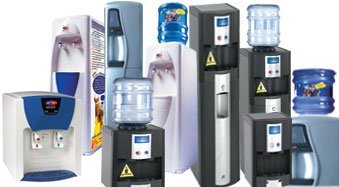
by Fern Shaw | Dec 7, 2012 | Water Coolers
How do bottle fed coolers and mains fed coolers differ?
Bottle fed water coolers are free standing units that use a large plastic bottle to deliver water, and can be either bottom or top loaded. Mains fed water coolers hook up to the main water supply and utilise filtration services to provide clean, crisp-tasting water. Both types of water coolers have an on/off switch that controls the cooling and/or heating functions of the dispenser.
How is the water kept cold?
In order to chill the water prior to dispensation, water coolers have a reservoir within the dispenser that holds a set amount of water. The reservoir is surrounded by pipes that have a refrigerant (a cooling medium) flowing through them.
What stops the bottle fed dispenser water from flooding?
When the bottle of water is inverted and placed into the opening on the top of the water cooler, the seal of the water bottle is severed or punctured by a part referred to as the ‘spike’, allowing the water to flow into the water cooler. Inside the water cooler is a further valve that prevents the water from the bottle flooding the water cooler.
How are water coolers kept clean?
Both Bottle Fed and Mains Fed Dispensers are kept clean by being sanitised. Bottle fed machines are sanitised every 3 months. Mains fed are sanitised every 6 months. An ozone generator is used for this purpose.
What is an ozone generator?
Ozone (O3) is a gas very similar to normal oxygen (O2), just with an added oxygen molecule. In water the effect of ozone is that it will kill all unwanted bacteria, spores and viruses, leaving the water container and water dispenser clean, clear and safe.
Where does the water in the coolers originate from?
In the case of AquAid’s water, from 3 natural springs in England, Scotland and Northern Ireland. All the spring water is bottled at source. The water is poured directly into the various sized bottles which are hermetically sealed to lock in the natural purity. And there it remains until it emerges from your water cooler, just as it left the source, cool and pure.

 Scott has just competed in the www.toughguy.co.uk competition and in doing so, raised in excess of £500 for Birmingham Dog’s Home www.birminghamdogshome.org.uk , further illustrating that it’s not just about a fellow man, but man’s best friend too.
Scott has just competed in the www.toughguy.co.uk competition and in doing so, raised in excess of £500 for Birmingham Dog’s Home www.birminghamdogshome.org.uk , further illustrating that it’s not just about a fellow man, but man’s best friend too. AquAid Birmingham believes strongly in optimum service, by ensuring that we effect prompt deliveries. This allows us to maintain multiple key accounts, a few examples being large contracts with many large building sites where they are on lengthy projects building new hospitals and large Tesco’s stores.
AquAid Birmingham believes strongly in optimum service, by ensuring that we effect prompt deliveries. This allows us to maintain multiple key accounts, a few examples being large contracts with many large building sites where they are on lengthy projects building new hospitals and large Tesco’s stores.

